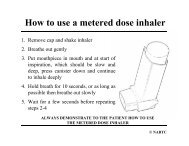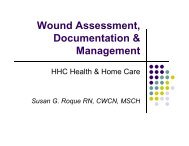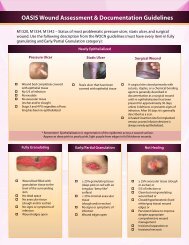HHC Health & Home Care Clinical Policy And
HHC Health & Home Care Clinical Policy And
HHC Health & Home Care Clinical Policy And
You also want an ePaper? Increase the reach of your titles
YUMPU automatically turns print PDFs into web optimized ePapers that Google loves.
<strong>HHC</strong> HEALTH & HOME CARE Section: 10-21<br />
Postpartum/Maternal/Newborn: Formula Preparation __RN<br />
PURPOSE:<br />
To prepare formula in accurate dilutions, utilizing clean<br />
technique.<br />
CONSIDERATIONS:<br />
1. Several types of milk-based and milk-free formulas<br />
are available according to infant's special need.<br />
2. Formula must be ordered by name of product,<br />
calories per ounce, number of ounces per feeding,<br />
and number of feedings per day.<br />
3. Normal dilution is 20 calories per ounce of formula.<br />
4. Caution should be taken when using higher calorie<br />
formulas as osmolarity and renal solute load are<br />
increased.<br />
5. Most hospitals have established guidelines for<br />
mixing formulas. Consult these guidelines.<br />
6. If dilutions higher than 27 calories per ounce are<br />
desired, a dietician needs to calculate formula as<br />
other additives may be utilized, i.e., corn oil, MCT<br />
oil, or polycose.<br />
7. In most urban areas with safe water systems,<br />
terminal sterilization of formula is not always<br />
necessary.<br />
8. Equipment should be cleansed with hot, soapy<br />
water and rinsed well with hot water or washed in a<br />
dishwasher.<br />
EQUIPMENT:<br />
Clean container<br />
Clean or disposable bottles<br />
Clean nipples<br />
PROCEDURE:<br />
1. Adhere to Universal Precautions.<br />
2. Boil water for 3 to 5 minutes if directed by physician<br />
or health department.<br />
3. Cool the water to room temperature.<br />
4. In clean container, pour the formula and cooled<br />
water according to the calorie and type of the<br />
formula:<br />
20 Calories/oz Formulas<br />
20 calories/oz Container Size Dilution Instructions<br />
Ready-To-<br />
Feed<br />
32 oz. can<br />
8 oz. can<br />
Concentrate 13 oz. can<br />
No Dilution required<br />
No Dilution required<br />
One part concentrate to one<br />
part water<br />
Powder 1 pound can 1 level scoop to 2 oz. water<br />
Evap. Milk 13 oz. can<br />
13 oz. can of milk plus 1 to<br />
2 tablespoons of corn syrup<br />
and 18 oz. of water<br />
5. To dilute higher calorie formulas, it is more accurate<br />
to make the entire day’s formula at one time. This<br />
avoids possible mistakes of mixing and measuring<br />
individual bottles:<br />
24 Calories/oz Formulas<br />
24 calories/oz Amt. Formula Amt. Water Yield<br />
Liquid Concentrate 13 oz. can 9 oz. 22 oz.<br />
Powder 17 scoops 28 oz. 32 oz.<br />
27 Calories/oz Formulas<br />
27 calories/oz Amt. Formula Amt. Water Yield<br />
Liquid Concentrate 13 oz. can 6 oz. 19 oz.<br />
Powder 19 scoops 28 oz. 32 oz.<br />
6. After the mixing of formula and water in the<br />
container, pour it into individual bottles, 2-4 ounces<br />
per bottle according to infant’s one time<br />
consumption.<br />
7. Put nipple and cap on.<br />
8. Refrigerate until ready to use.<br />
AFTER CARE<br />
1. Document in patient’s record:<br />
a. Method of formula preparation and amount<br />
prepared.<br />
b. Instructions given to caregiver.<br />
c. Return demonstration by caregiver of formula<br />
preparation if greater than 20 calories per<br />
ounce formula.<br />
245







